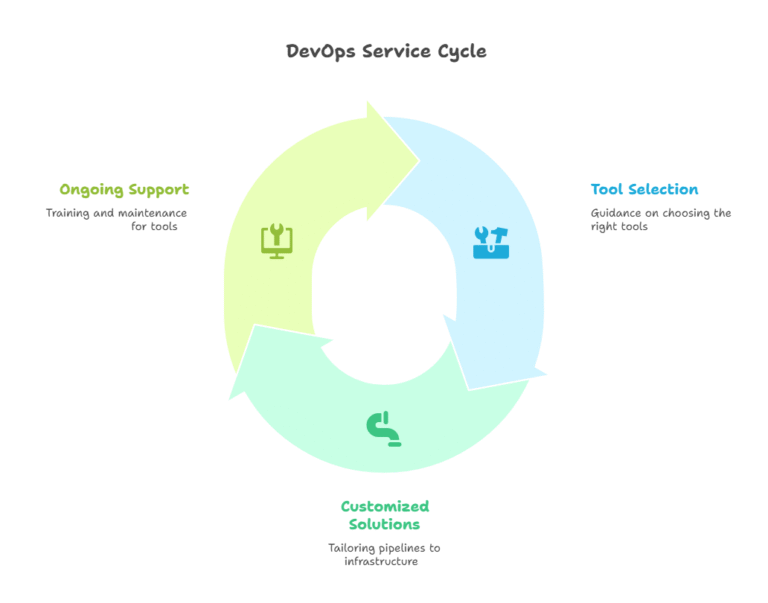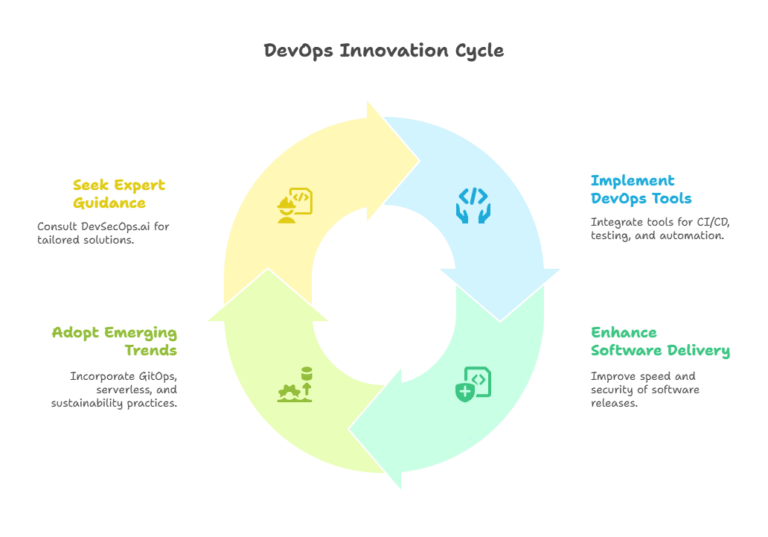In 2025, DevOps technologies are transforming how organizations deliver software by enabling seamless collaboration, automation, and scalability. This guide explores the latest DevOps tools, DevOps toolchains, and DevOps platforms to build efficient pipelines. From DevOps continuous integration tools to DevOps testing and DevOps automation tools, we’ll cover essential technologies like CI/CD with ArgoCD, hybrid cloud management tools, DevOps AI tools, and MLOps platforms. Partnering with a DevOps service company can help you leverage these tools effectively to stay ahead.
DevOps technologies bring development and operations teams together to streamline software delivery. A DevOps toolchain integrates various DevOps tools for coding, building, testing, deploying, and monitoring, ensuring end-to-end automation. DevOps platforms unify these tools into a single ecosystem, enhancing collaboration and visibility. In 2025, selecting the right DevOps tool is critical for delivering high-quality software faster and more reliably.

DevOps continuous integration tools automate code integration and testing, enabling teams to detect issues early. CI/CD with ArgoCD, a GitOps tool for Kubernetes, ensures applications remain synchronized with Git repositories through automated deployments, rollbacks, and drift detection. This makes it a cornerstone of modern DevOps pipeline tools.
Other popular DevOps tools for continuous integration include:
These tools work seamlessly with DevOps pipeline tools like Tekton and Spinnaker, ensuring smooth transitions from development to production. In 2025, CI/CD with ArgoCD is essential for organizations managing Kubernetes-based applications.
DevOps testing ensures software quality across the pipeline. Continuous testing tools automate unit, integration, and performance tests, reducing manual effort and accelerating delivery. Key tools include:
DevOps and test automation enable teams to catch defects early, improving reliability. AI-powered continuous testing tools predict potential failures, making them critical for 2025 pipelines. Integrating these tools into DevOps toolchains ensures quality at every stage.
DevOps automation tools eliminate repetitive tasks, from infrastructure provisioning to application deployment. Leading tools include:
These tools integrate with hybrid cloud management tools like Google Anthos, Red Hat OpenShift, and VMware Tanzu, enabling seamless operations across on-premises and cloud environments. Automation is a core component of DevOps platforms, driving efficiency in 2025.
DevOps platforms provide integrated environments for planning, building, testing, and deploying software. Top platforms include:
These platforms enhance DevOps pipeline tools, ensuring traceability and collaboration. A DevOps service company can tailor DevOps platforms to your infrastructure, optimizing workflows and productivity.
DevOps AI tools leverage machine learning to enhance pipeline performance. Key tools include:
These tools identify bottlenecks, predict failures, and automate remediation, making them vital for modern DevOps tools. In 2025, AI-driven insights are transforming how teams manage complex pipelines.
MLOps platforms apply DevOps principles to machine learning, automating model training, deployment, and monitoring. Leading platforms include:
MLOps platforms ensure production-ready ML models, critical for AI-driven applications. In 2025, integrating MLOps platforms with DevOps toolchains gives organizations a competitive edge.
Hybrid cloud management tools unify on-premises and cloud environments, ensuring scalability and governance. Key tools include:
These tools complement DevOps automation tools, balancing cost, performance, and security in hybrid cloud setups. They are essential for organizations managing complex infrastructures in 2025.
Security is a priority in DevOps, and DevSecOps tools integrate protection throughout the pipeline. Leading tools include:
AI-driven DevSecOps tools prioritize threats and automate fixes, ensuring secure deployments without slowing delivery. In 2025, these tools are critical for compliance and innovation.

Implementing a DevOps toolchain requires expertise. A DevOps service company provides:
Partnering with experts ensures your DevOps strategy is efficient, scalable, and aligned with business goals.

In 2025, DevOps technologies and DevOps tools—from DevOps continuous integration tools like CI/CD with ArgoCD to continuous testing tools, DevOps automation tools, and MLOps platforms—are driving innovation and efficiency. DevOps platforms, hybrid cloud management tools, and DevOps AI tools empower organizations to deliver secure, scalable software. Trends like GitOps, serverless architectures, and sustainability underscore the need for a robust DevOps toolchain.
At DevSecCops.ai, we are a leading DevOps service company, offering tailored solutions to transform your pipelines. Whether you need expertise in DevOps pipeline tools, DevSecOps tools, or MLOps platforms, we’re here to help. Visit DevSecOps.ai to unlock the full potential of DevOps technologies and accelerate your success in 2025.